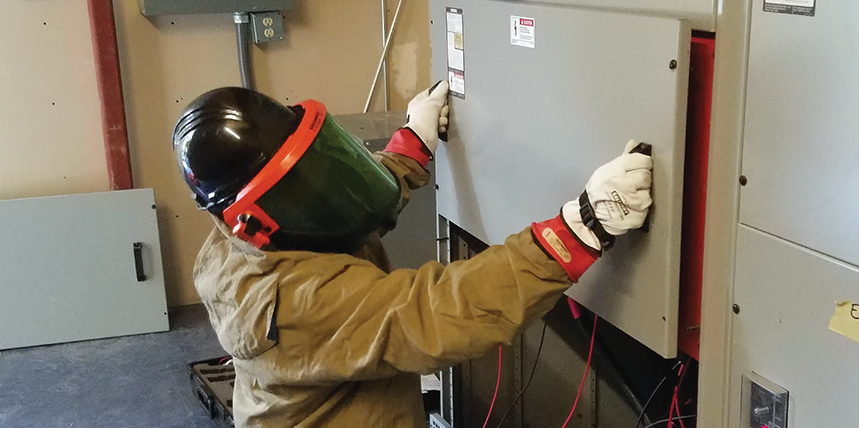For some companies, deciding whether to perform power monitoring studies with their own in-house professionals or subcontract the work out may be a real toss-up. There is no general right answer, but there is a right answer for you. That answer may change over time. This article is a guide to making (and revising) that decision.
To be clear, this only applies to organizations with professionals on staff who are trained in working with power and are capable of learning how to safely install a power analyzer.
THE CASE FOR THE IN-HOUSE OPTION
Potentially Money-Saving
- If you have staff who have the ability and time to perform the work, it’s hard to fail to achieve cost savings when doing the testing yourself. They are already on the payroll, you trust their abilities, they are likely to already be familiar with the equipment and operating environment, and they have clearances to get access to the equipment.
- If you are concerned that there may not be enough power studies to justify buying and maintaining a system, you can rent at a favorable rate. For example, if systems are rented at a rate of 1/8 the cost of buying, but you expect to do testing only a couple of times a year, you can minimize your costs by renting a system when needed. The bonus of renting is that the rental is guaranteed to be working and calibrated; this is key to your success and confidence in the results.
- If your personnel are capable of doing the work but not available or strong at setting the analyzer up and creating a summary report, you may be able to pay a knowledgeable third-party consultant to set the analyzer up for your specific test and/or to generate a summary or comparison report.
- Typically, a contracted source will need clearance and escort during the setup and teardown of the equipment installation. If you will have to assign personnel to serve as escort, why not save money and use them to do the setup and tear-down?
- If you expect enough studies to justify buying a power analysis system, you might consider turning it into a revenue source by doing testing for other companies or divisions.
- If you decide to buy, consider the long-term cost of ownership. Explore whether you can renew the warranty repeatedly and determine the cost of required calibration.
Obviously, the choice depends on the expected demand for power system analysis work for each individual organization, but research has shown that this type of work is only growing. A 2020 survey of electrical contractors found that electrical testing, maintenance, and power quality work has been steadily increasing since 2014.
Speed & Ease
There is no doubt that getting a power study done with the same staff that will do the rest of the job would be easier and faster. Delays when using an outside source arise from:
- Researching
- Contracting
- Scheduling
- Coordinating with another company
These activities take time and effort and are an unneeded distraction. Even if you have a subcontractor you routinely go to, there may be delays and complications when they need access to the test site in order to work on the equipment, which takes your personnel away from other work. If sudden changes to the schedule are required, your personnel are probably better equipped to adjust to the new circumstances than your subcontractor would be.
Quality Control
If you or your personnel are perfectly capable of completing a power study on your own, it can seem counterintuitive to hire an outside company to provide the same level of service. By doing everything in-house, you can control the conditions, pace, and overall success of the work.
Hiring an electrical testing company means your project can only be as successful as they are, so outsourcing may not be worth the risk for some decision-makers. If your company is doing a job for a client, and the subcontractor cannot deliver your company’s level of excellence in that area of the job, it can reflect poorly on your company in the eyes of the client.
THE CASE FOR SUBCONTRACTING
The Flip Side of Money-Saving
If your organization is rarely called on to perform power studies, it may be more economical to hire a third-party testing company. Buying or renting test equipment and training your staff are a strategic investment of funds and time, and it may not be worth it if you do not do power monitoring projects often enough.
If you are having the testing done for your client, it may be easier to pass the testing organization’s bill through to your client rather than for you to tack on additional charges for doing the testing yourself.
A potential indirect cost is the ability of your personnel vs. the subcontractor to correctly identify problems and develop solutions for your facility. If the testing is needed, obtaining correct results and correct interpretation probably outweighs the cost of the testing.
Experienced, Proven Professionals
Professional electrical testing service companies do not exist as a luxury; they provide services that are generally superior to what can be done in-house. Generally, it is hard to go wrong hiring a NETA accredited company (NAC) for any power monitoring job. Subcontracting to an NAC reduces risk and provides peace of mind in knowing that they have been there, done that, and will know how to perform almost any test successfully, thereby minimizing error and maximizing safety.

Time-Saving
On top of having confidence that the work will be done well, there is benefit to subcontracting as much of the job as you can to an outside firm. The subcontractor will likely do the job more efficiently due to expertise and familiarity, and it takes the details off your mind. Not everyone has the luxury of being able spend valuable time researching, buying, or renting equipment; acquainting their staff with the new tools; and managing their testing process. If that is your situation, letting a testing company take care of the study could be exactly what is needed.

A Fair Third Party
Getting quality and objective results from a fair and competent third-party testing and measurement company gets results that may be more readily accepted by management or your own clients. Clients and managers can trust that you’re not prescribing a solution or raising a problem that does not have a legitimate basis. In some situations or locales, this may even be a requirement.
CONCLUSION
The need for power system analysis and study is not going away. The choice remains whether your organization will perform the work in-house or hire an experienced company to do it for you. Generally, more money can be saved (and made) by adding power monitoring to your arsenal versus obtaining a more consistent level of service in subbing the test out.
If you do not have the personnel to do the work in-house, or if your job requires testing be done by a third party, the choice becomes which testing company to hire, not whether you should hire one. Additionally, if you are like many electrical professionals today who are seeing increased demand for power monitoring, you might consider adding it to your wheelhouse, potentially saving money or making some money by putting this new expertise to work.
REFERENCES
Ross, Chuck. “2020 Profile of the Electrical Contractor.” Available at https://www.ecmag.com/sites/default/files/2020_Profile_of_the_EC_0.pdf.
 Roger Graver is the Marketing Manager for Summit Technology, Inc. He has a BS in marketing from San Jose State, graduating with honors. He is relatively new to the electrical testing industry and is always looking for ways to help Summit Technology deliver what electrical testing companies are asking for.
Roger Graver is the Marketing Manager for Summit Technology, Inc. He has a BS in marketing from San Jose State, graduating with honors. He is relatively new to the electrical testing industry and is always looking for ways to help Summit Technology deliver what electrical testing companies are asking for.
